‘Humble, gracious, kind:’ Sheboygan's Carol Buschmann, member of the Chordettes, dies at 96
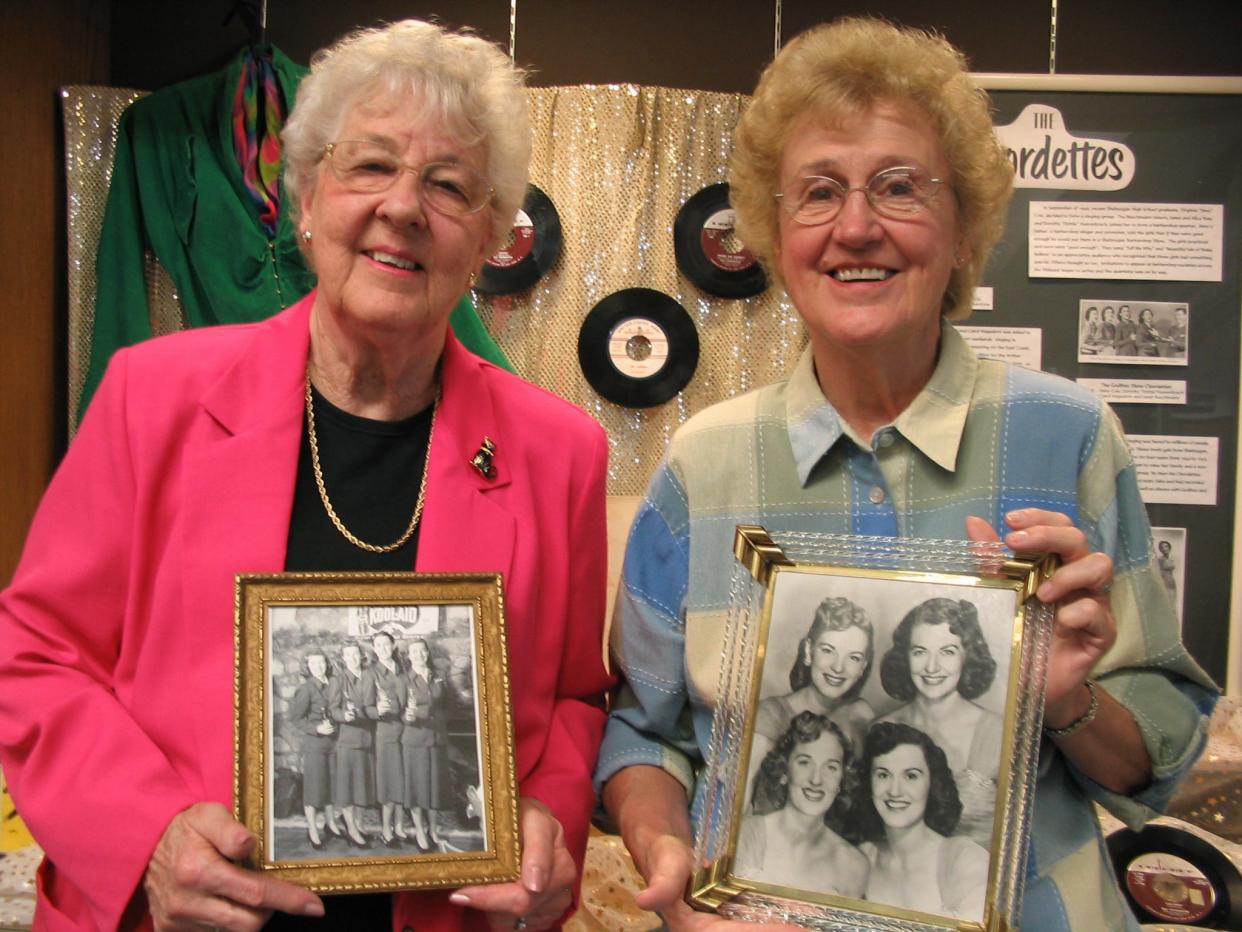
SHEBOYGAN — Carol Buschmann, famed member of the Chordettes whose voice is featured on “Mr. Sandman,” “Lollipop” and more, died Sept. 30. She was 96.
The world-renowned singer, who was featured on every major recording for the group and only missed one tour to give birth to her daughter, is remembered by family, friends and the community as humble, kind and gracious.
Kathy Nelesen, Buschmann’s cousin, said it’s hard to capture her humility and normalcy. Growing up, Buschmann acted like any other cousin she had.
“I think back to those days, when I was so thrilled to have a person of that stature in our family ― all of the things you'd expect a kid to feel, I was feeling that ― I never, ever felt anything but welcomed and loved,” Nelesen said. “And so her life, when she would talk about it, it was always in a position of humility.”
Born and raised in Sheboygan, Buschmann was the last surviving Sheboyganite Chordettes member. She is survived by Marjorie Latzko of New York.
A memorial service will take place at 1 p.m. Nov. 4 at Ballhorn Chapels in Sheboygan. The service will follow visitation, beginning at 10 a.m.
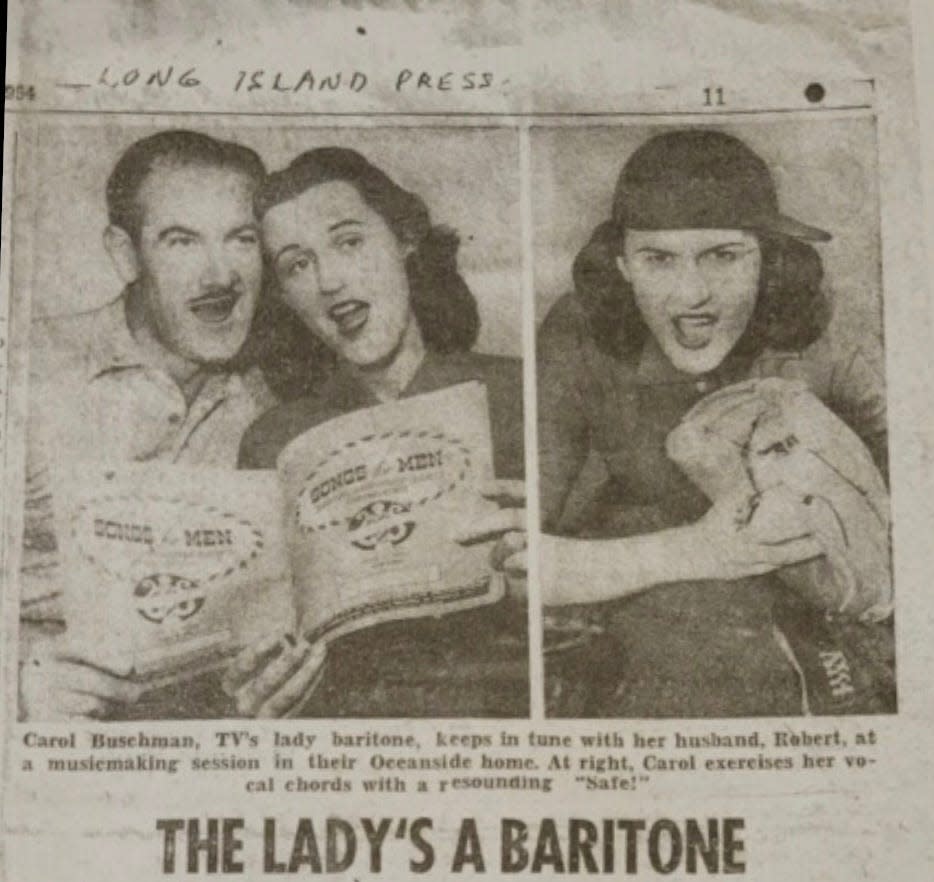
‘A great baritone’
Janet Sly, Buschmann’s daughter, said she didn’t realize for most of her life that her mother had been famous.
One day, a man came into Toro Trophies & Awards, the sporting goods-turned trophy shop Buschmann and her family owned, asking Buschmann for an autograph. Sly said Buschmann acted like it was no big deal and told a few stories after the man insisted.
Sly remembers being amazed by her humility.
“I played in her gowns — her sequined gowns — and dressed up in all her costume jewelry and gloves and such, but never really looked at her that way until after that, with this person that came in for an autograph,” she said.
After her time with the Chordettes, Buschmann moved from New York to Sheboygan in 1968 with her husband and Sly. Sly said they came back to Wisconsin because their family and roots were in Sheboygan.
In her life, Buschmann was “very humble and very confident at the same time,” Sly said. She said she’s never seen that combination in someone else before.
Buschmann’s ability to be honest and open, but never hurtful, was one reason she was an excellent businesswoman, Sly said. She said employees always wanted to work hard for Buschmann and truly cared about her.
Buschmann was a baritone for the Chordettes and Sly said she remembers talking to her about the role. Buschmann said a good baritone should never be able to be picked out while listening to the music, and her role was to make the rest of the women sound good.
Sly said that sums up her personality perfectly, “she was a great baritone.”
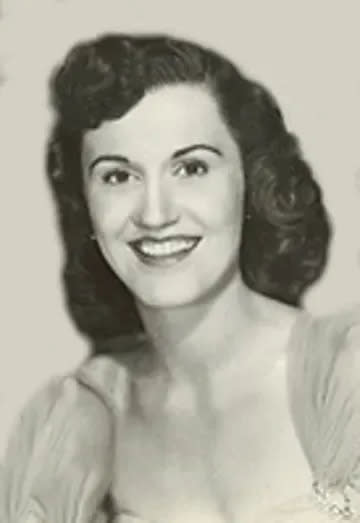
Nelesen, who worked with Buschmann to create a memoir and family memory book, said Buschmann was a hard worker with incredible work ethic who just did things, without taking credit for them.
No matter what she did, from singing with the Chordettes, to owning a business on Long Island, or working in Sheboygan, she tackled every opportunity she was given and was grateful for the experience.
Suzanne Miller, long-time friend of Buschmann's, said Buschmann was “a lot of fun.” She remembers bringing lyrics to songs she and Buschmann’s friends knew to lunch, and they would all sing together.
“She was just the sweetest person I've ever met,” Miller said. “None of this went to her head. We just had a long friendship. I was able to keep seeing her up until COVID, I think. I still visited with her. Her memory problems got worse, but it was really a lovely friendship.”
For more than 10 years before she died, Buschmann had dementia, struggling with short-term memory issues, Sly said. Sly said in this time, Buschmann was still receiving fan mail from people around the world telling her about how they would sing Chordettes songs with their grandparents.
Buschmann would sign autographs and send them back to the fans.
While Buschmann’s dementia got worse, music was a constant in her life.
In the nursing home, during Buschmann’s last few months of life, Sly put on a barbershop CD and Buschmann was able to sing almost every word. Sly said she may not have known where she was, but she knew all the words to those songs.
“It’s really special,” Sly said. “Music does something to the soul.”
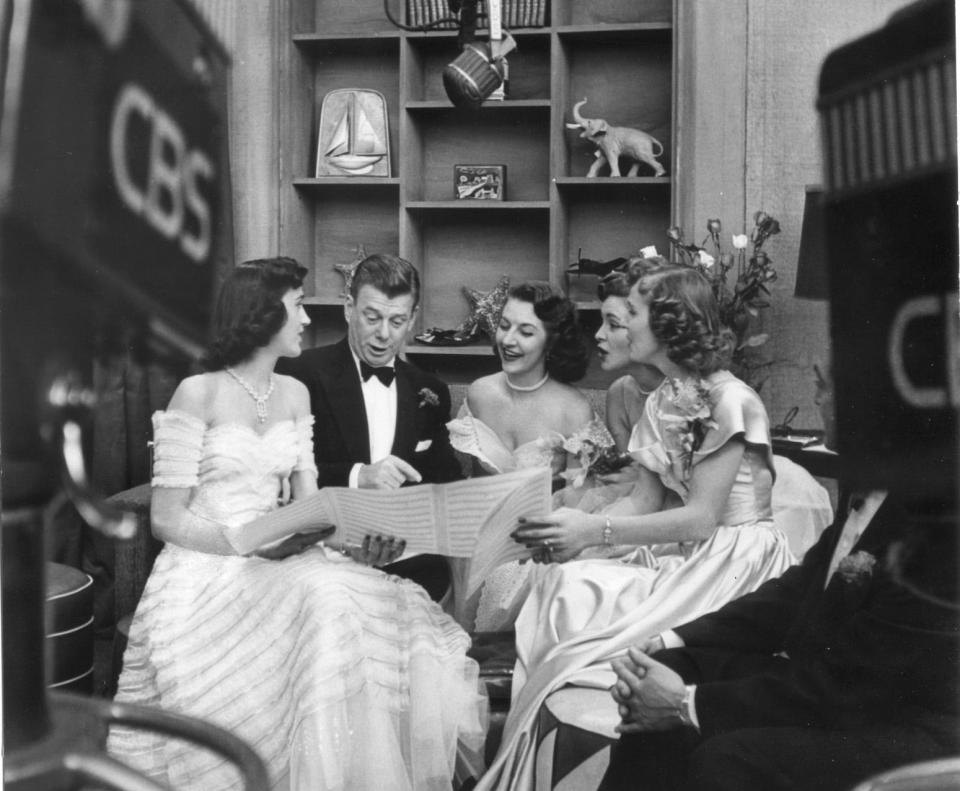
A brief history of the Chordettes
Starting as four Sheboygan girls who loved singing, the Chordettes grew into international stars.
The group began in the barbershop community because one of the original member’s father was president of the National Barbershop Association, Nelesen said.
Buschmann was brought into the group in their early stages of performing to replace a member who got married and started a family.
In the 1940s, women did not participate in barbershop, making the Chordettes the first of their kind, Nelesen said.
“As a result, these four young, attractive girls from Sheboygan, were quite a novelty,” she said. “And they sang and they sang well, and they would often go traveling around the country to these barbershop conventions, where they would be the novelty act.”
They gained fame outside the barbershop community after they auditioned for the Arthur Godfrey show. All the groups in the contest performed and the country had a week to vote on who won and would secure a place on the show, Nelesen said. The barbershop community flooded the votes and the Chordettes won.
During the span of the group’s career, there were eight total members, five from Sheboygan, Nelesen said. Back then, it was a different time, where the women would leave the group because they got married or had children they needed to take care of.
More Chordettes: 'Bring me a dream': Remembering Wisconsin's famed Chordettes
Buschmann was in the group the longest and was on every major recording. She was also on every tour, excluding one in Europe when she gave birth to Sly.
Nelesen said Buschmann had planned to take more time off after Sly was born, but one of the members stayed in Europe with her husband and Buschmann fit back in the clothing, so she returned.
Archie Bleyer was one of the people who helped the group move from traditional a cappella barbershop arrangements to the style they are widely known for today, Nelesen said. He can even be heard asking “Yes?” in the group’s recording of “Mr. Sandman.”
Buschmann remembered Bleyer bringing in a full orchestra for their recording of “The Exodus Song” during events in the Middle East, Nelesen said.
“It was the first time they had recorded that magnitude of a piece with that much power behind it, and she would get tears in her eyes every time she told the story,” Nelesen said. “Because of the power that went into that recording session with the instruments swelling, and reaching that final conclusion, and ‘this land is mine.’”
While touring can be lonely, the women were like family, Nelesen said. In addition to themselves, they also picked up friends on the way and met many others.
Nelesen said in one year, Buschmann met President Dwight D. Eisenhower, Elvis Presley and Frank Sinatra.
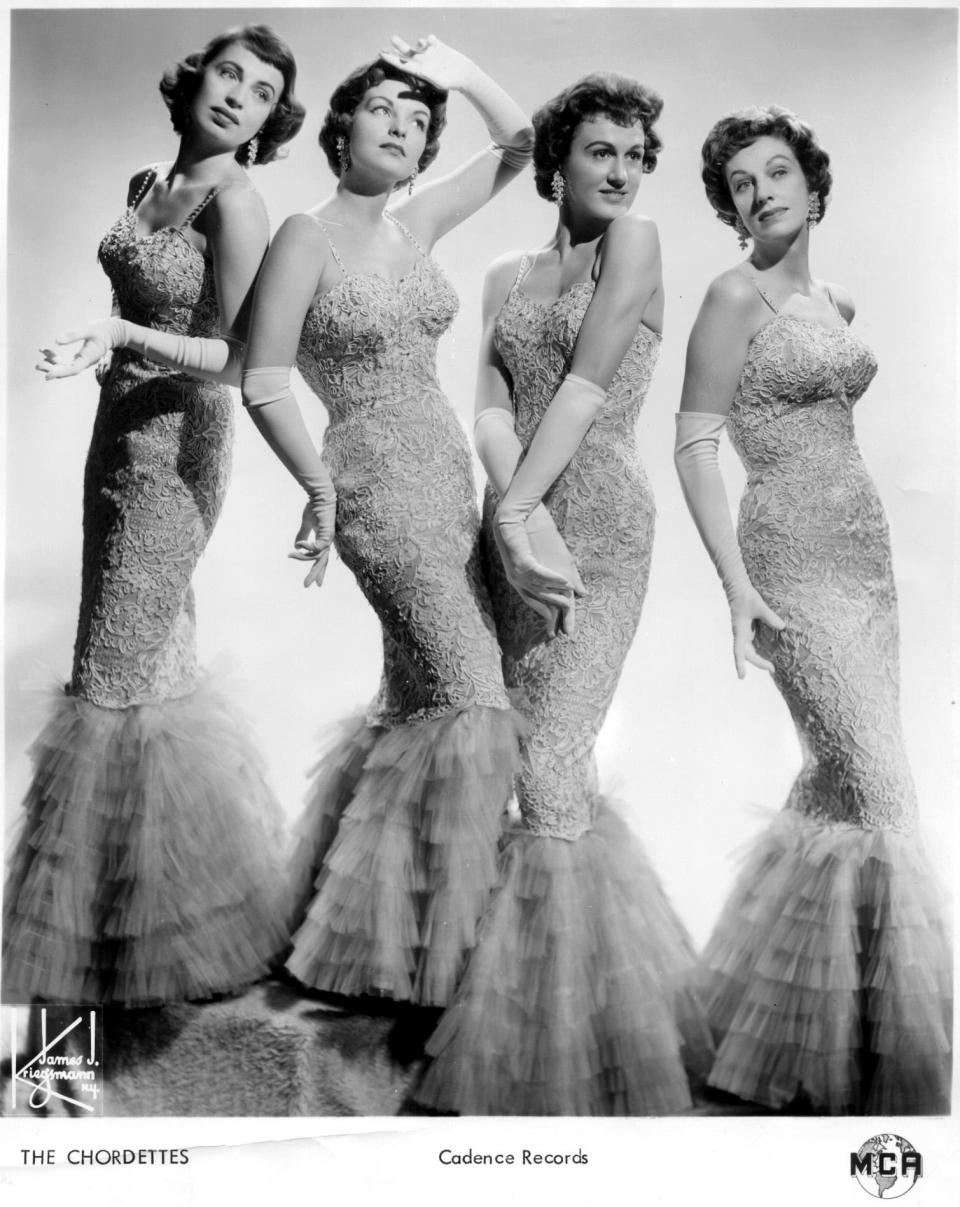
Buschmann and the Chordettes’ legacy in the community
Despite the Chordettes gaining international fame, a part of their history will always be connected to the Sheboygan community, said Travis Gross, executive director of the Sheboygan County Historical Museum.
Buschmann and the other Sheboygan members of the group have family and connections in the community who will pass their stories through time.
Gross said this legacy is important because while world events often connect to Sheboygan, the Chordettes were able to connect the world with Sheboygan.
“Their songs are still being played today, which is really impressive, considering how many millions of songs have been out there, that you still have a few that are still rolling,” Gross said. “That's kind of cool. And then from just little Sheboygan. How we get mentioned in some of these things, it's just amazing.”
Along with many knowing the music of the Chordettes and even members personally, the community also actively commemorated the group’s legacy. For several years, the museum has hosted a Chordettes display with pieces of their history.
Every November from 2016 to 2018, Ivy Viola and three other drag queens performed a Chordettes show featuring songs from the group and other music from the era at Sheboygan's Blue Lite bar.
“I personally grew up listening to the Chordettes,” Ivy Viola said. “My grandmother spent a lot of time watching me as a child, and the Chordettes and other artists of that time were her preferred music choice. So, we’d clean the house, or bake or do whatever and songs like ‘Sandman,’ ‘Lollipop,’ what-have-you would always kind of be around. And so, it was something that felt very special to me, but also special to the community.”
For the shows, a local designer recreated the dresses the Chordettes wore, Ivy Viola said.
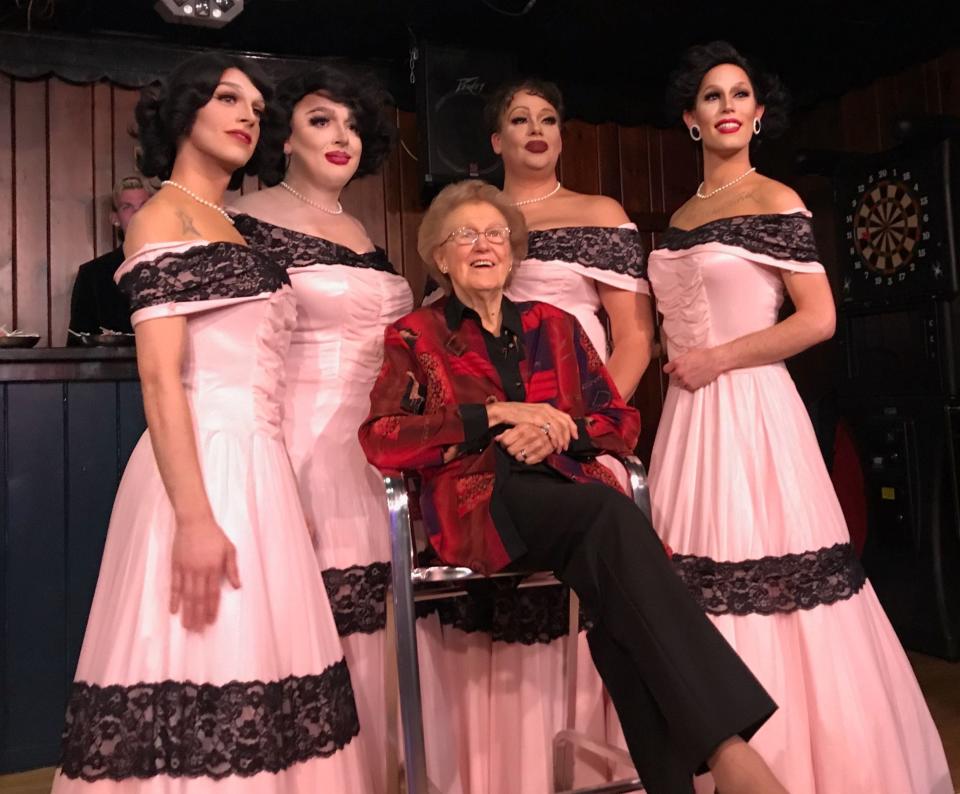
In 2018, Buschmann came to their show, sitting front and center. Ivy Viola said, while slightly intimidating, it was a highlight to perform such important songs to one of the people who sang them.
“Having her sit right in front and just smiling and swaying along and really enjoying the performance and the experience was something that really can't be matched,” Ivy Viola said. “It was a very humbling and unique experience.”
Buschmann seemed to be having the time of her life, Ivy Viola said. She was singing every word and looked to be enjoying the music that was so important to her.
While the community lost a direct connection to the past with Buschmann’s death, it is not the end of her and the Chordettes’ legacy, Gross said. Continuing to pass on the music and history to future generations is critical.
“The Chordettes have a great history and they have connections to things in New York and California and whatever, but I think the strongest connection with the Chordettes is always going to be here,” Gross said. “And there's something to be said about that. That's what makes it strong and relevant. It'll never, I mean, hopefully, the Chordettes are never forgotten in Sheboygan’s story. They shouldn't be.”
Have a story tip or public interest concern? Contact Sam Bailey at sgbailey@gannett.com or 573-256-9937. To stay up to date on her stories and other news, follow her on X (Twitter) @SamarahBailey.
This article originally appeared on Sheboygan Press: Chordettes member Carol Buschmann, of Sheboygan, dies at age 96

